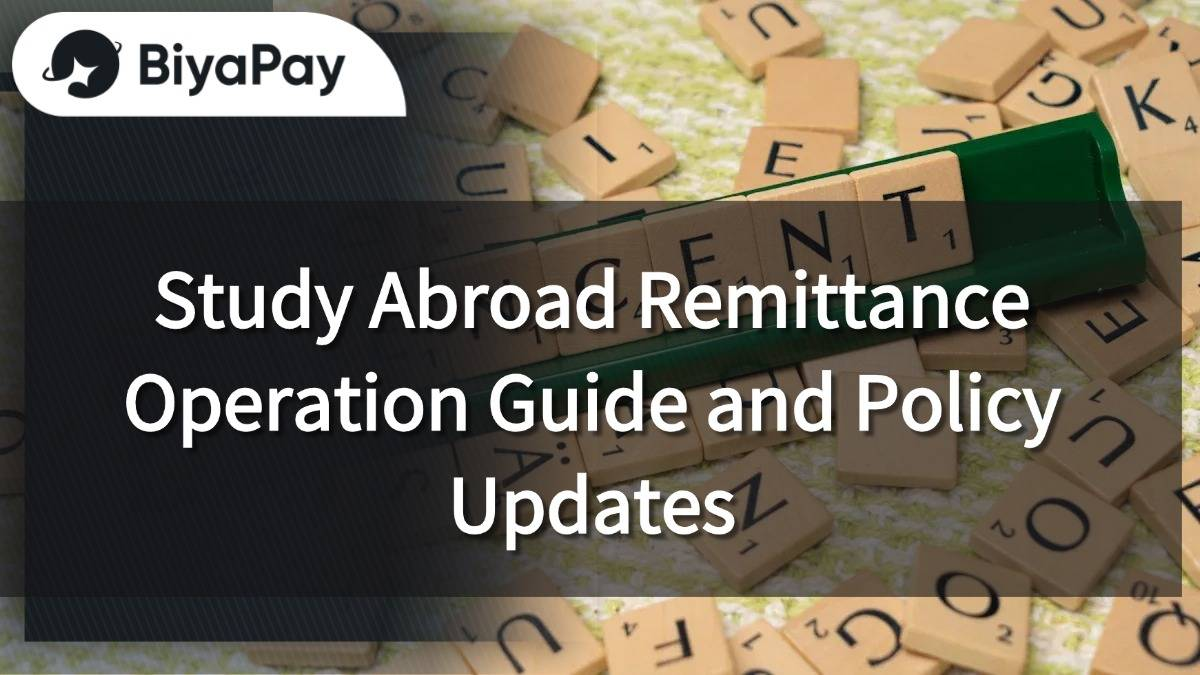- EasyCard
- Trade
- Help
- Announcement
- Academy
- SWIFT Code
- Iban Number
- Referral
- Customer Service
- Blog
- Creator
Study Abroad Remittance Operation Guide and Policy Updates

Image Source: unsplash
In 2025, study abroad remittance policies have undergone significant changes, directly impacting the financial pressure on international students. According to the latest statistics, tuition fees and additional costs in some countries have risen sharply. For example, the tuition fees for the Materials Science program at Oxford University have increased by 21.9% compared to 2024, and the immigration health surcharge has also increased by 65%. These changes mean you need to plan your funding sources and remittance methods more carefully to reduce financial burdens.
When addressing the new policies, safety and efficiency are crucial. You can refer to the following suggestions: Choose reputable remittance platforms, avoid operating account information on public networks, and promptly verify transaction records. Ensure each remittance complies with study abroad remittance declaration requirements, especially for large transactions, and consult professionals to avoid legal risks. Through these strategies, you can better protect your personal finances and adapt to policy changes.
Key Points
- The 2025 study abroad remittance policy changes significantly, with tuition fees and additional costs rising sharply, requiring international students to plan funding sources in advance.
- Choose reputable remittance platforms to ensure remittance safety and efficiency, and avoid operating account information on public networks.
- New policies require more supporting documents, so prepare tuition bills and accommodation contracts in advance to ensure a smooth remittance process.
- Understand the remittance policies of different countries and choose appropriate remittance methods to avoid troubles caused by policy restrictions.
- Regularly check remittance status to ensure funds arrive on time, and if a remittance fails, promptly contact bank customer service to resolve the issue.
Major Changes in 2025 Study Abroad Remittance Policy
Remittance Limit Adjustments and Declaration Requirements
In 2025, the study abroad remittance policy has adjusted remittance limits and declaration requirements. These changes directly affect your cash flow and remittance convenience. The new policy may require you to provide more supporting documents, such as tuition bills or accommodation contracts. This increases the complexity and time cost of remittances. To address these changes, you need to prepare relevant documents in advance to ensure a smooth remittance process.
The following are key data showcasing the impact of policy changes:
- Remittance limits for study abroad are stricter, potentially requiring split remittances to meet daily limits.
- Declaration requirements are more detailed, possibly requiring additional forms or bank statement records.
- As policies adjust, the remittance behaviors and habits of international students are also changing, with more people inclined to choose low-fee remittance methods.
You can choose exclusive account services provided by Hong Kong banks, such as HSBC One Account or Bank of China Cross-Border GO Card. These accounts not only have low fees but also support real-time exchange rates and fund safety guarantees. The following is a specific comparison:
| Account Type | Handling Fee | Exchange Rate Advantage | Policy Support |
|---|---|---|---|
| HSBC One Account | Zero handling fee for global remittances | Real-time mid-market exchange rate, no hidden markups | Daily limit of HKD 300,000, meeting large-amount needs |
| Bank of China Cross-Border GO Card | Fee as low as 0.1% | T+0 arrival, real-time tracking of remittance status | Complies with Hong Kong payment system regulations, ensuring fund safety |
New Compliance Regulations
The 2025 policy also introduced new compliance regulations aimed at enhancing the transparency of fund flows. These regulations require you to comply with stricter review processes during remittances. For example, banks may conduct detailed checks on the purpose of your remittance and the source of funds. While these measures increase operational complexity, they also effectively reduce the risk of illegal fund flows.
According to statistical data, the number of companies involved in data compliance reviews has changed in recent years:
| Time Period | Number of Companies Involved in Data Compliance Reviews |
|---|---|
| 2016-2019 | 22 |
| February 2021 to February 2022 | 20 |
To meet these compliance requirements, you can consult professionals or bank customer service in advance to ensure all documents and information comply with regulations. This can prevent remittance failures or delays.
Policy Changes in Specific Countries/Regions
Policy changes in different countries and regions are also worth noting. For example, the United States and the United Kingdom have stricter declaration requirements for study abroad remittances, possibly requiring additional tax proof. In contrast, policies in Australia and Canada are relatively lenient but still require compliance with local foreign exchange regulations.
You need to choose appropriate remittance methods based on the specific requirements of the target country. For example, if you are studying in the UK, you can choose a Hong Kong bank account that supports real-time exchange rates to ensure funds arrive quickly. If the target country has limits on remittance amounts, split remittances may be a safer option.
By understanding these policy changes, you can better plan the remittance process and avoid unnecessary troubles.
Comparison of Advantages and Disadvantages of Study Abroad Remittance Methods

Image Source: unsplash
Fees and Efficiency of Bank Wire Transfers
Bank wire transfers are one of the most traditional methods for study abroad remittances. They are suitable for large-amount remittances but have higher fees and longer arrival times. You need to pay a fixed handling fee, typically between 200 and 500 RMB. Additionally, the arrival time for bank wire transfers is usually 3 to 7 business days, with lower efficiency.
The following is a comparison of fees and efficiency between bank wire transfers and other methods:
| Type | Remittance Fees | Arrival Speed |
|---|---|---|
| Bank Wire Transfer | Higher | Longer |
| Professional International Remittance Companies | Higher (about 3%) | Faster (T+1) |
If you choose wire transfer services from Hong Kong banks, such as HSBC or Bank of China Hong Kong, they offer higher fund safety and global coverage. However, you need to understand the handling fees and arrival times in advance to plan fund usage reasonably.
Convenience of Third-Party Payment Platforms
Third-party payment platforms provide great convenience for small, frequent cross-border payments. Their cost structure is simple, mainly including platform service fees and transaction handling fees, with overall lower fees. You can complete payments quickly through these platforms without undergoing cumbersome verification processes.
The following are the advantages of third-party payment platforms:
- Low handling fee rates, suitable for high-frequency, small-amount transactions.
- Simple payment process, no need for offline operations.
- Offers multiple bank and card options, enriching payment methods.
- High security with transparent fund flows.
For example, PayPal and Wise (TransferWise) are two common third-party payment platforms. Their fee ranges are 4-5% and 0.5%-1%, respectively, with arrival times ranging from real-time to 1-2 business days.
| Remittance Method | Fee Range | Arrival Time |
|---|---|---|
| Bank Transfer | 200-500 RMB | 3 to 7 business days |
| PayPal | 4-5% transaction fee | Real-time (may be delayed) |
| Wise (TransferWise) | 0.5%-1% | 1 to 2 business days |
Applicable Scenarios for Foreign Exchange Services
Foreign exchange services are suitable for scenarios requiring the conversion of RMB to other currencies. You can complete exchanges through a Hong Kong bank’s foreign exchange account, enjoying real-time exchange rates and fund safety guarantees. This method is suitable for paying large expenses such as tuition and accommodation fees.
If you need flexible exchange services, you can choose accounts that support real-time exchange rates, such as the HSBC One Account or Bank of China Cross-Border GO Card. These accounts not only have low fees but also help you quickly complete fund transfers, avoiding losses due to exchange rate fluctuations.
By understanding the advantages and disadvantages of different remittance methods, you can choose the most suitable method based on your needs to ensure fund safety and efficiency.
Practical Guide to Study Abroad Remittances

Image Source: unsplash
Specific Steps for Opening a Foreign Exchange Account
Opening a foreign exchange account is the first step in study abroad remittances. You need to choose a bank that supports foreign exchange services and prepare relevant materials. The following are the specific steps:
- Choose a Bank: Prioritize reputable international banks, such as HSBC or Bank of China Hong Kong. These banks offer safer fund management and real-time exchange rate services.
- Prepare Materials: Bring identification documents, passports, study abroad admission letters, and other documents required by the bank. Ensure all materials are authentic and valid.
- Fill Out Application Form: Complete the foreign exchange account application form at the bank counter or online. Double-check information to avoid errors.
- Account Activation: After completing the application, the bank will open the account for you. You need to deposit a certain amount to activate the account.
Through these steps, you can successfully open a foreign exchange account, preparing for subsequent remittances.
Remittance Process and Precautions
The remittance process includes fund preparation, filling out remittance information, and confirming transactions. You need to ensure each step is accurate to avoid remittance failures or delays. The following is the detailed process:
- Fund Preparation: Deposit the required remittance amount into the foreign exchange account. Ensure the account balance is sufficient to cover handling fees.
- Fill Out Remittance Information: Include the recipient’s name, bank account, SWIFT code, etc. Verify the information to avoid errors.
- Confirm Transaction: After submitting the remittance application, the bank will review it. Once approved, the funds will arrive within the specified time.
Precautions:
- Avoid operating remittances in public network environments to protect account safety.
- Regularly check remittance status to ensure funds arrive on time.
- If a remittance fails, promptly contact bank customer service to resolve the issue.
The following is a display of the feasibility and effectiveness of the remittance process:
| Evidence Type | Specific Content |
|---|---|
| Data Transaction Agreement Arrangements | In data transactions, both parties need to clarify key matters through agreements to ensure data sharing and delivery. |
| Data Transaction Object Definition | Both parties should agree on the type, content, and scope of data products to ensure transaction clarity. |
| Data Security Law and Personal Information Protection Law | Laws stipulate security requirements for data processing activities, ensuring data safety and personal information protection. |
By following these processes and precautions, you can improve remittance efficiency and reduce operational risks.
How to Meet Study Abroad Remittance Declaration Requirements
Meeting study abroad remittance declaration requirements is key to ensuring remittance legality. You need to understand policy regulations and prepare relevant documents. The following are specific suggestions:
- Prepare Materials in Advance: Include tuition bills, accommodation contracts, bank statements, etc. These documents are necessary for declarations.
- Comply with Legal Regulations: According to the Data Security Law and Personal Information Protection Law, ensure the security of personal information and fund flows.
- The Data Security Law stipulates security protection obligations for data processing activities.
- The Personal Information Protection Law requires classified management and security technical measures for personal information.
- Consult Professionals: If unsure about declaration requirements, consult bank customer service or professional advisors to ensure all documents comply with regulations.
Through these methods, you can easily meet study abroad remittance declaration requirements and avoid legal risks.
Common Issues and Solutions in Study Abroad Remittances
Reasons for Remittance Failures and Handling Methods
Remittance failures are common issues in study abroad remittances. You need to understand the reasons for failures and take effective measures to resolve them. The following are common reasons:
- Incorrectly filled remittance information, such as mismatched recipient names or bank account numbers.
- Bank prompts for remittance returns, possibly due to policy restrictions or account issues.
- Other bank processing issues, such as system failures or network delays.
Solutions include:
- Check the bank’s remittance status to confirm the reason for failure.
- Take measures based on the specific issue, such as refilling correct remittance information or contacting bank customer service.
- If the issue is complex, consult professionals for further assistance.
By addressing issues promptly, you can avoid fund delays and ensure smooth remittances.
How to Reduce Exchange Rate Losses
Exchange rate fluctuations may reduce remittance amounts. You can adopt the following strategies to minimize losses:
- Use financial tools, such as forward contracts or options, to lock in exchange rates and reduce fluctuation risks.
- Choose remittance methods that support real-time exchange rates, such as Hong Kong bank foreign exchange account services.
- Offer multiple payment methods to avoid reliance on a single currency.
Enterprises have effectively reduced exchange rate losses through these strategies. You can also choose suitable methods based on your needs. For example, locking exchange rates in advance can help you avoid additional costs due to exchange rate changes.
Practical Tips for Addressing Policy Restrictions
Policy restrictions may increase remittance difficulties. You need to adopt practical tips to address these challenges:
- Understand the target country’s remittance policies in advance to ensure all documents meet requirements.
- Split remittances to avoid single transactions exceeding limit restrictions.
- Partner with reliable banks or payment platforms to ensure fund safety.
For example, if the target country has restrictions on remittance amounts, you can choose split remittances or use account services that support large transactions. Through these tips, you can better adapt to policy changes and ensure funds arrive smoothly.
The 2025 study abroad remittance policy changes significantly, and you need to pay special attention to remittance limit adjustments and compliance requirements. Choosing appropriate remittance methods and complying with declaration regulations are crucial. Incorrect operations may lead to the following risks:
- Failing to file declarations on time or incorrectly may result in warnings or fines ranging from 1%-5% of the transaction amount, up to a maximum of 30,000 RMB.
- Serious violations may constitute crimes, such as money laundering or tax evasion, leading to criminal liability.
Plan fund flows in advance, choose low-fee, high-efficiency remittance methods, and ensure complete declaration materials. Through these measures, you can easily adapt to policy changes and ensure fund safety.
FAQ
1. Why Was My Remittance Returned?
A remittance may be returned due to incorrect information, such as mismatched recipient names or account numbers. You need to carefully verify all information to ensure accuracy. If the issue persists, contact bank customer service for assistance.
2. How to Ensure Remittances Meet Study Abroad Declaration Requirements?
Prepare relevant materials in advance, such as tuition bills and accommodation contracts. Ensure all documents are authentic and valid, and fill out declaration forms as required by the bank. If unsure, consult professionals or bank customer service.
3. How to Avoid Exchange Rate Losses During Remittances?
Choose remittance methods that support real-time exchange rates, such as Hong Kong bank foreign exchange account services. You can also use forward contracts to lock exchange rates, reducing risks from fluctuations. Planning remittance timing in advance also helps minimize losses.
4. What Should I Do If a Remittance Fails?
First, check the bank’s remittance status to confirm the reason for failure. Common issues include incorrect information or policy restrictions. Take measures based on the specific issue, such as refilling correct information or splitting remittances. If the issue is complex, consult professionals.
5. Which Remittance Method Is Best for Paying Tuition?
Bank wire transfers are suitable for large payments, such as tuition, with high security but higher fees. Third-party payment platforms are suitable for small payments, with low fees and fast arrivals. Choose the most suitable method based on your needs.
In 2025, study abroad remittances face rising tuition costs (e.g., Oxford’s Materials Science program up 21.9%), stringent declaration requirements (e.g., tuition invoices, accommodation contracts), and exchange rate volatility, with traditional methods often costly and slow. BiyaPay offers a seamless, cost-effective solution for student transfers! Exchange over 30 fiat currencies and 200+ cryptocurrencies with real-time rate tracking to mitigate volatility, and benefit from transfer fees as low as 0.5% across 190+ countries, with same-day initiated, same-day delivered transfers. Sign up for BiyaPay in just one minute to effortlessly manage tuition payments, living expenses, and US/HK stock investments. Plus, grow idle funds with a 5.48% annualized yield on flexible savings. BiyaPay leverages blockchain technology for secure transactions, backed by U.S. MSB and SEC licenses to ensure compliance and minimize transfer failures. Start now—join BiyaPay for a secure, efficient study abroad remittance experience!
*This article is provided for general information purposes and does not constitute legal, tax or other professional advice from BiyaPay or its subsidiaries and its affiliates, and it is not intended as a substitute for obtaining advice from a financial advisor or any other professional.
We make no representations, warranties or warranties, express or implied, as to the accuracy, completeness or timeliness of the contents of this publication.




Contact Us
Company and Team
BiyaPay Products
Customer Services
is a broker-dealer registered with the U.S. Securities and Exchange Commission (SEC) (No.: 802-127417), member of the Financial Industry Regulatory Authority (FINRA) (CRD: 325027), member of the Securities Investor Protection Corporation (SIPC), and regulated by FINRA and SEC.
registered with the US Financial Crimes Enforcement Network (FinCEN), as a Money Services Business (MSB), registration number: 31000218637349, and regulated by FinCEN.
registered as Financial Service Provider (FSP number: FSP1007221) in New Zealand, and is a member of the Financial Dispute Resolution Scheme, a New Zealand independent dispute resolution service provider.



















